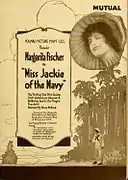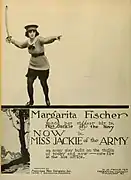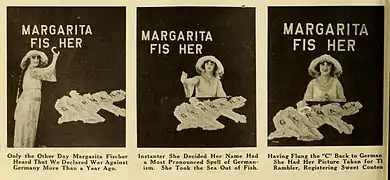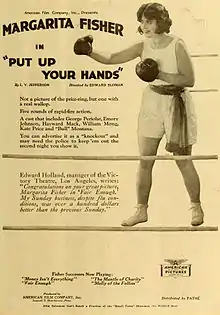Margarita Fischer
Margarita Fisher (née Fischer, February 12, 1886 – March 11, 1975) was an American actress in silent motion pictures and stage productions.[1]
Margarita Fischer | |
|---|---|
 Moving Picture World, 1917 | |
| Born | February 12, 1886 Missouri Valley, Iowa, U.S. |
| Died | March 11, 1975 (aged 89) Encinitas, California, U.S. |
| Other names | Margarieta Fisher Margarite Fisher Margurita Fisher |
| Occupation | Actress |
| Years active | 1910–1927 |
| Spouse(s) | |
Theater
As a child performer, and later as an ingenue star of the stage, Fischer, from Missouri Valley, Iowa, was widely regarded in stock company groups of the Pacific Coast. Her father, John, was a noted minstrel. Fischer made her stage debut in Portland, Oregon, in the famous child role of Adrienne in The Celebrated Case. Her rapidly growing popularity led to her father forming the Margarita Fischer Stock Company. The theatrical group toured up and down the Pacific Coast for a number of years. She met her eventual husband, film director Harry A. Pollard, when they played opposite each other in San Francisco, California, stock. Some years later the two met again, as actors with the Selig Polyscape Company, with the Imp Company in New York, New York, and even later, with Universal Pictures.
Motion pictures
Fischer was in Hollywood silent films from at least 1910 until 1927. Her first screen experience began with the American Company. There followed 3 years as a leading woman for Universal. In 1913 she starred in How Men Propose written and directed by Lois Weber for Universal, which at the time was still based on the east coast. When the American Beauty Company was organized she was engaged for each of the star feminine roles.
She is well known for her role as an African-American slave girl in the Harriet Beecher Stowe three-reel epic Uncle Tom's Cabin. She was co-featured with Harry Pollard in this Universal feature. It was in this role, as Eliza, that Fischer won a long-term contract with the American Film Company in Santa Barbara, California. She received international acclaim as the American Beauty of the screen. Her face was pictured in the heart of a rose, which became one of the movie's trade marks. Pollard directed the Universal superproduction of Uncle Tom's Cabin which was released in 1927. This time Margarita was cast in the more mature role of Eliza.
Aside from this film, the actress' motion pictures of note include Lost: A Union Suit (1914), A Joke On Jane (1914), The Quest (1915), Robinson Crusoe (1917), Impossible Susan (1918), Trixie From Broadway (1919), The Thirtieth Piece of Silver (1920), and Any Woman (1925). In April 1916 Fischer and her husband launched the Pollard Picture Plays Corporation. Pollard directed, Margarita acted, and director/producer George W. Lederer was their protégé. Their initial production was The Pearl of Paradise. It was staged in Los Angeles, California, Honolulu, Hawaii, and the South Sea Islands.
Later years and death
During World War I Fischer changed the spelling of her last name to Fisher because of the anti-German sentiment in America. She is sometimes credited as Margarieta Fisher, Marguerite Fisher,[2] Margarite Fisher, and Margurita Fisher.
She died in Encinitas, California, of heart disease in 1975.
Gallery
 Miss Jacky of the Navy (1916)
Miss Jacky of the Navy (1916) Miss Jacky of the Army (1917)
Miss Jacky of the Army (1917) Name change during the war.
Name change during the war. Put Up Your Hands (1919)
Put Up Your Hands (1919)
Filmography
|
|
References
- Margarita Fischer: a biography of the silent film star by Teresa St. Romain c. 2008; McFarland Books
- Blake, Michael F. (1998). "The Films of Lon Chaney". Vestal Press Inc. Page 3. ISBN 1-879511-26-6.
- Sandusky, Ohio Star-Journal, Saturday, April 8, 1916, Page 10.
- Syracuse, New York Herald, "Topsy Grows To Eliza In Movie", Sunday Morning, September 28, 1930.
External links
| Wikimedia Commons has media related to Margarita Fischer. |
